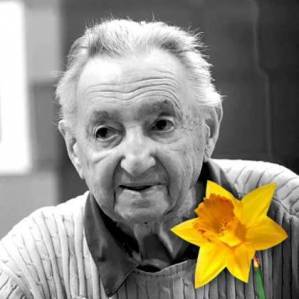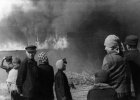In Memory: The Warsaw Ghetto Uprising

Marek Edelman, one of the leaders of the Warsaw Ghetto Uprising, also took part in the Warsaw Uprising in 1944 and in Solidarity.
It is seventy years today since the beginning of the Warsaw Ghetto Uprising when between 200 and 500 poorly armed Polish Jews confronted the Germans, determined to die fighting, defending honour and dignity.
The Germans had arrived with tank, armoured vehicles and hard artillery to “clear” the Ghetto. They expected to swiftly send the remaining (approximately) 60 thousand Jews to the Treblinka Death Camp.
Marek Edelman, the only surviving leader of the Uprising later told Hanna Krall:
“We knew that we needed to die publically, so that the world saw us… It was about choosing a way of dying”.
Marek Edelman recalled their victory on that first afternoon on 19 April. The Germans were taken aback. Some were killed, and the others forced to retreat. It was only a temporary victory since the Germans returned with massive reinforcement, but a victory nonetheless.

The Uprising had been planned, but events were forced by the arrival of around 850 Germans (together with men from an SS unit of Ukrainians trained at Trawniki, and later also Latvians and Lithuanians).
The Nazis had chosen the morning of the most sacred day of Pesach for religious Jews.
The fighters had received some arms from the Polish Resistance (Armia Krajowa), but as Władysław Bartoszewski, member of AK and of Żegota, (the Polish Council to Aid Jews), points out, nobody but the Nazis had many weapons.
On one of the buildings on Muranów Square two flags were raised that day: the Jewish white and blue flag and Polish red and white.
On 23 April members of the Jewish Fighting Organization [Zydowska Organizacja Bojowa] pasted the following message onto the Ghetto Wall on the Aryan side.
“Poles, Citizens, Soldiers of Freedom.
Amid the noise of cannons which the German army is using to storm our homes, the flats of our mothers, children and wives;
Amid the rattle of machine-gunfire which we are gaining in our fight with cowardly gendarmes and SS-men;
Amid the smoke of fires and dust, of the blood of the murdered Warsaw Ghetto, we – prisoners of the Ghetto – send you brotherly, sincere greetings.
We know that with heartfelt pain and tears of sympathy, with admiration and anxiety you are following the outcome of this battle for many days now we have been waging with a terrible occupier.
Yet you also know that each threshold of the Ghetto as before will remain a fortress. Perhaps we will all perish in this fight, but we will not give in. (You know) that we, like you, long for revenge and punishment for all the crimes of our common enemy.
A battle is raging for your Freedom and ours.
For your and our human, social, national honour and dignity.
We will avenge the crimes of Oświęcim, Treblinka, Belżec and Majdanek.
Long live the brotherhood of arms and the blood of Fighting Poland!
Long live Freedom!
Death to the butchers and henchmen!
Long live our fight to the death and life against the occupier!
The Germans responded by trying to frighten Poles by pasting up their own message warning Poles that they would be killed for helping the Jews.
The fighting continued until mid-May. There were around 40 survivors who escaped through the sewers and were rescued (in broad daylight) on the Arian side of the Wall.
On the eve of the Anniversary, Prayers and Kadisz were read in the Main Warsaw Synagogue with those present including Symcha Rotem (“Kazik”) who rescued Marek Edelman and 29 others from the Ghetto; Władyswaw Bartoszewski; and other Poles (like him) named Righteous of the Nations.
Their prayers were in memory of those who fell during the Warsaw Ghetto Uprising.
The event was“also an expression of gratitude to the Just among the Nations who, risking their lives, saved Jews from the Warsaw Ghetto.





